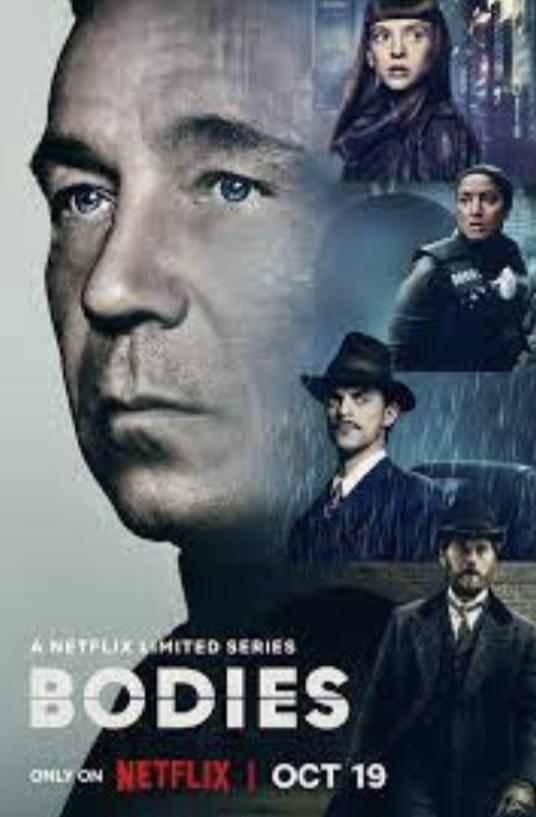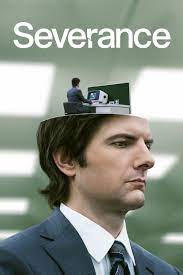Netflix’s new series “Bodies,” based on the comics by Si Spencer, is one of the better shows that’s been available on streaming in a while, with wild plot twists, a gripping story, and solid performances. Also, it’s the dumbest show I’ve ever seen. I’m sure it’s hard to make time-travel logic followable, but man, this is on another level of ridiculousness.
The series follows four detectives in different time periods who all find the same naked dead body in the same road in London, and, as you may have been able to guess, time-travel shenanigans ensue. Each detective struggles with their own personal issues: Alfred Hillinghead in 1890 grapples with his sexual identity, 1941’s Detective Whiteman deals with his Jewish heritage in the midst of the Blitz, DI Hasan in 2023 is a Muslim single mother dealing with civil unrest, and Iris Maplewood in 2053 has to cope with a bad haircut. Meanwhile, a mysterious man played by the ever-exceptional Stephen Graham pops up in all the timelines as the intrepid inspectors race to solve the same time crime.
In terms of quality, the creators knew what they were going for and didn’t swing for the fences, opting for a solid popcorn show instead of prestige television. Although this choice mostly paid off, I can’t help but wonder if it could’ve been a truly brilliant show in different hands. Each detective’s challenges are only commented on at surface level, and the only true conflicts they face are time-traveling serial killers. I’m not trying to downplay the seriousness of time-traveling serial killers, but highlighting the more realistic struggles could’ve made the series a bit more grounded. Furthermore, the series is so British at its essence that I wish the writers could’ve incorporated more critiques about the often tumultuous history of the nation. Had a more ambitious showrunner been present, the series could’ve doubled as a satisfying murder mystery and an intelligent commentary on England’s past and present.
In spite of this, they absolutely succeed at making entertaining television. With a wild twist out of nowhere approximately every ten minutes and four unique murder investigations, each containing their own obstacles, the series is truly impossible to look away from. The excitement is constant, particularly in the back half of the series. I was so far on the edge of my seat I nearly fell off it a few times. The show’s emotional moments hit surprisingly hard, and although they can sometimes feel obligatory and hokey, they never dominate the show. The writers truly understand we didn’t come here for feelings, we came here for some good old fashioned time-travel murder!
The series stays focused on the plot, which is undoubtedly compelling, but creates some further issues. The characters aren’t given nearly enough time to develop, instead being forced to all possess the same exact personality and feel a variety of stock emotions, which 99% of the time end up as the ever-relatable feeling of, “This time-travel business is crazy!” If you asked me to describe the unique characteristics of each detective, I would be drawing blanks: Hillinghead is determined, I guess, and morally pretty solid; Hasan is determined and morally very solid; and Maplewood is determined and needs a haircut.
The only character to escape this archetype of “detective who’s generally a pretty good person” is Whiteman in 1941. From the get-go, he’s involved in some shady business, killing and lying his way to success, but that changes when he meets Esther, a young Jewish orphan who escaped the Holocaust and was brought to England. They form a touching, father-daughter-esque relationship, that is, until she’s murdered by a mysterious woman. For the rest of the series, Whiteman grows bitter and vengeful as he chases the killer and seeks justice for Esther, going up against the enigmatic time-travel cult all the while. One of his scenes in episode six (which happens to be one of the most exciting 56 minutes I’ve ever seen) is undoubtedly the most shocking and bold moment in the series, which doesn’t usually pride itself on reinventing the wheel. When Whiteman finally reaches the house of the killer, she attempts to plead with him but, without hesitation, he executes her, then proceeds to kill another major antagonist in the process without even blinking (don’t worry though, time-travel rules mean that said antagonist isn’t actually dead – well, sort of, but also not). This scene’s sudden brutality completely subverts all expectations and adds a gorgeous layer of moral complexity to a series that is generally lacking on that front.
Jacob Fortune-Lloyd does a solid enough job of playing Whiteman, as despite his somewhat ham-handed attempts to be suave and debonair throughout the earlier episodes, his anger and quest for vengeance is powerful thanks in part to his portrayal of Whiteman’s grim determination. Back in 1890, Kyle Soller is perfectly adequate as Hillinghead. He doesn’t do too much challenging acting, but when he really has to let the emotions fly, he is definitely doing acting, which is a good sign, I think. Amaka Okafor, who plays Hasan, is rock solid throughout and seems like she’s a good actress. Unfortunately, her character doesn’t do much more than yell things like “Where’s the bomb?” and “This time-travel business is crazy!” and “I’m a single mother!”, so I can’t definitively say that she’s a brilliant actor. However, she does a great job considering what she’s been given. As Maplewood, Shira Haas is a little off putting. Her distinct, unique face is far more befitting of supporting character roles rather than a futuristic action hero, and it doesn’t help that she looks like she lost a bet with her friends and had to get that haircut as punishment.
Perhaps the strongest acting in the show is from Stephen Graham. I first saw the perpetually underrated actor in the breathtaking film series “This is England,” in which he steals every single scene as the unstable skinhead Cosmo. When I heard he would be appearing in “Bodies,” I was immediately in, and he didn’t let me down. His character has some very complex time-travel shenanigans going on that I still don’t completely understand, but he has to play a handful of different roles across the different periods. Impressively, he’s able to bring completely different energies to his two most involved parts in 1890 and 2053. In the future, his Commander Elias Mannix is an imposing antagonist that carries a deep sadness with him, while his character back in Victorian days is a more conniving, unsubtly sinister villain who inhabits the upper crust of London’s high society. In addition to giving each character a unique sense of menace, he also changes between a posh London accent and his native northern English dialect with ease, demonstrating his spectacular range and talent.
On the subject of spectacular talent, “Bodies” makes about as little sense as this transition. The time-travel logic is comically convoluted and from the get-go it’s nearly impossible to even partially follow along. By the time I reached the final few episodes I realized it was a better idea to simply ignore the ridiculousness and not think too hard, and I’m certain that if I had kept trying to keep up I would’ve gone insane attempting to make sense of the nonsensical. The pseudoscientific and wildly complex explanations for the time-travel and the characters’ motivations based on said time-travel aren’t the only nonsense, however. Multiple times per episode, you can’t help but be left thinking, “Huh?”, and questioning the procedure the police departments employ. Don’t even get me started on the ending, too. “Bodies” has one of the most mind-numbingly ludicrous final scenes I’ve ever been forced to sit through, and it’s a true shame the writers couldn’t even try, just a tiny bit, to make a followable show.
Furthermore, the accents are baffling. Maplewood and her brother, both of whom grew up in London and have lived there their whole lives, have completely different accents that are extremely bothersome. This makes you wonder why they would cast an Israeli actress with a noticeable accent in a show all about British people in Britain. At the same time, Esther, the vaguely European orphan, speaks with a flawless English accent. The casting of Haas and the lack of effort to have Esther’s English actress Chloe Raphael attempt an accent are nearly as baffling as the time-travel logic, which I truly couldn’t begin to explain here even if I tried.
In spite of its baffling logic and its many, many, many flaws, as a whole, “Bodies” is an exceptional show. It’s consistently thrilling, unpredictable, and solidly acted. The premise is fun and so is the show, and what more could you ask for? It’s eight hours of thoroughly entertaining popcorn TV, and although it could’ve been more than that, it remains one of the most satisfying and gripping shows in recent memory.




































